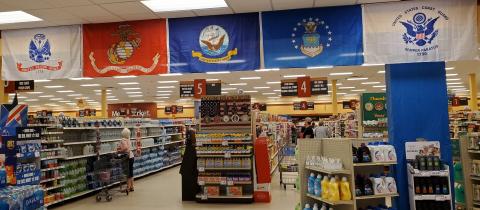Legacy of service: Oct. 1 marks 29th year of DeCA delivering commissary benefit

FORT LEE, Va. – On Oct. 1, 1991, the Defense Commissary Agency officially took over the responsibility of providing the commissary benefit to U.S. military members and their families.
As the agency enters its 29th year of managing the military’s commissaries the impact of the benefit cannot be overstated said William F. Moore, DeCA’s new Director and CEO.
“My father was a disabled vet who fought as an Army NCO in both the Korean and Vietnam conflicts. He earned the benefit for our family, and the savings we experienced at the commissary enhanced our quality of life,” Moore said. “So, I owe a lot to the benefit, that’s why I’m such a believer. And it’s my desire – my 100 percent goal – to make sure we get that benefit out to every single eligible patron.”
The concept of commissaries is nothing new.
In 1825, Army officers were allowed to begin purchasing at cost in Subsistence Department warehouses on various posts. By 1841, officers were allowed to purchase goods for their wives and children and the stock list changed as a result. In 1867, this same privilege was afforded to enlisted men. At the time any Subsistence Department warehouse could become a sales store regardless of whether it was located in a large city or on the frontier.
Before the creation of DeCA, military commissaries were run by the individual military services. The Navy and Marine Corps opened their first stores in 1909 and 1910, respectively. The Air Force inherited their stores from the Army Air Corps in 1947 and 1948.
By the mid-1970s each of the separate services was running their own commissaries:
- The Troop Support Agency, or TSA, ran the Army stores
- The Navy Resale System Support Office, or NAVRESSO, ran the Navy and Marine Corp stores
- The Air Force Commissary Service, or AFCOMS, ran the Air Force stores
- The U.S. Coast Guard operated smaller scale stores inside exchanges.
In 1989 Congress directed the Department of Defense to conduct a study on the separate military commissary systems and as a result it was recommended that all of the separate systems be brought together into one agency in order to save money and improve customer service, establishing DeCA on May 15, 1990.
On Oct. 1, 1991, DeCA assumed control of all military commissaries from its headquarters at Fort Lee, Virginia.
Over the past 29 years many changes have evolved in the commissaries including self-checkouts, digital coupons, the addition of private label brands, and now the ongoing rollout of an Internet-ordering/curbside pickup program known as CLICK2GO.
The list of eligible commissary shoppers has also changed. In addition to a patronage group that includes active duty military and retirees and their spouses, active duty Reserves and National Guard, the benefit now extends to disabled veterans.
With all the changes, to include a COVID-19 pandemic, DeCA’s mission continues to provide annual savings – currently at more than 23 percent – and deliver the benefit as efficiently as possible, Moore said.
“Throughout its history DeCA has earned a great reputation for serving the military community in good and bad times,” Moore said. “Our employees have shown their dedication and innovation, combined with the support of our industry partners, in keeping commissary shelves stocked amid the COVID-19 pandemic.”
-DeCA-
About DeCA: The Defense Commissary Agency operates a worldwide chain of commissaries providing groceries to military personnel, retirees and their families in a safe and secure shopping environment. Commissaries provide a military benefit, saving authorized patrons thousands of dollars annually on their purchases compared to similar products at commercial retailers. The discounted prices include a 5-percent surcharge, which covers the costs of building new commissaries and modernizing existing ones. A core military family support element, and a valued part of military pay and benefits, commissaries contribute to family readiness, enhance the quality of life for America’s military and their families, and help recruit and retain the best and brightest men and women to serve their country.
